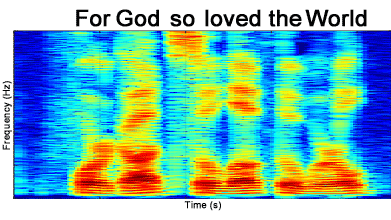What do the Fast Fourier Transform and artificial neural nets have to do with the Great Commission? It has taken me years to answer this question.
God led me into a relationship with him through his Son Jesus Christ while I was a college student studying electrical engineering at the Massachusetts Institute of Technology (MIT). I attended a missions-minded church, so I heard quite a lot about people around the world who have never had a chance to hear the Gospel. I was regularly challenged to consider what role I might play in God’s global plan. However, the roles that I heard about seemed limited to those of a pastor, or a missionary, or something in alleviating poverty. Those are all clearly important roles, but for some reason those roles just never appealed to me and I felt guilty about it.
As I look back, I realized that deep down inside of me I was hoping for a way to use my skills in math, science, and engineering to serve God. I’d always excelled in math and anything that required strong math skills since elementary school. I would have been overjoyed to hear someone tell me that there were math problems to be solved so that someone could hear the gospel.
The first stop on my path to glorifying God with my math and science skills was learning to see my work in the secular world as an act of worship. As I did research on satellite-based weather sensing for my Ph.D. in electrical engineering (also at MIT), I regularly went to earth science remote sensing conferences. I learned that improved global weather sensing could lead to improved global climate models, weather forecasts, water supply management, and agricultural planning —all of which are important to meeting basic needs around the world. God could use my weather sensing work to make a way for someone in a distant part of the world to hear the gospel and turn to him! My work was not merely an academic exercise but was actually a spiritual act of worship and a service to the world! That gave me the motivation I needed to persevere in my technical training.
I learned that improved global weather sensing could lead to improved global climate models, weather forecasts, water supply management, and agricultural planning —all of which are important to meeting basic needs around the world. God could use my weather sensing work to make a way for someone in a distant part of the world to hear the gospel and turn to him! My work was not merely an academic exercise but was actually a spiritual act of worship and a service to the world!
Later, as I transitioned between jobs, I started to see the possibility of using my technical skills more directly for missions. In addition to signal processing and artificial intelligence, for most of my life I’ve also been interested in languages. I’m a 2nd-generation Taiwanese-American, so I grew up speaking English, Mandarin Chinese, and Taiwanese, and I’ve always been interested in learning more. I’m fascinated by how people express themselves through their languages. Whenever I’ve gone to missions conferences, I’ve felt drawn toward presentations given by missionaries with Wycliffe Bible Translators, and have had the privilege of supporting missionaries sent out through Wycliffe.
In 2007, I gave a presentation on my work in satellite-based weather sensing at a conference on artificial intelligence in Orlando, Florida, which happens to be where Wycliffe USA is headquartered. During the conference I saw posters and presentations on a wide range of applications, among them machine translation.
The day after the conference ended, I went on a tour of the Wycliffe USA headquarters. During the tour, I began to see how my technical skills could be used in efforts to translate God’s Word into every language so that no one will have to learn another language in order to understand the gospel. I thought to myself, “Wouldn’t it be great if someone in the world of technology could bring cutting-edge technology into the world of Bible translation?”
I ended up sharing these thoughts with my tour guide, and she arranged for me to meet with several other Wycliffe members after the tour. My plans for a morning visit to Wycliffe ended up lasting well into the afternoon! One of the missionaries I spoke with called technology Wycliffe’s “best-kept secret.” During that week in Orlando, I finally figured out how signal processing and artificial intelligence could be used to further Bible translation.
I’m still on that path of glorifying God through my skills as an electrical engineer. I see myself working in the secular world while participating in conferences and reading journals searching for technology that could be useful to Bible translators. Perhaps I will even be a part of developing some of that technology, myself. In the meantime, I hope to spread a vision for using gifts in the STEM fields (science, technology, engineering, and math) to serve God. There’s not just a place for technology in missions, there’s a real need! No matter your skill, there’s a place for you in God’s global mission.

